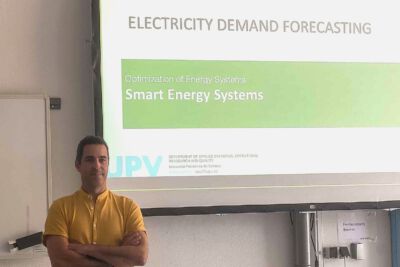Exchange with the University of Valencia
Prof. Oscar Dominguez visits Campus Feuchtwangen
Oscar Dominguez studied industrial engineering at the “Universitat Politècnica de València” in Spain. His diploma thesis was written in cooperation with the Technical University of Ilmenau in Germany. He then worked for several years at Alstom in the rail vehicle sector, and later in the automotive supply industry, before becoming a teacher of organization and projects in mechanical manufacturing in Valencia.

In 2009, he decided to do another master’s degree in Data Analysis, Process Improvement and Decision Making, also at the University Politecnica de Valencia. Oscar Dominguez has now been a professor there since 2013.
The University in Valencia and Ansbach University of Applied Sciences have been cooperating for several years. This includes joint exchange, mutual support and cooperation in projects and doctorates. As part of this, Prof. Dominguez was also at the Campus Feuchtwangen last week during his visit to the university.

With his expertise in statistics with a focus on load forecasting and load prediction, Prof. Dominguez has enriched the Optimization of Energy Systems course as a guest lecturer:
“For the development and expansion of smart energy systems, it is essential to know what will happen in the next hours or even days. What share of generation will be covered by photovoltaics (PV) and wind? What will be the consumption of industry and households? This coordination of generation and consumption is an important factor in the energy industry,” said Prof. Dominguez in his presentation.
“Utilities need to make predictions for the next day and plan their resources. The most accurate forecast possible for this is crucial for the company from an economic point of view. Even small deviations can cause high costs.”
Prof. Dominguez showed the students how to make predictions using historical data as a basis. For example, he uses load curves, weather data, temperature, wind and global radiation. In the lecture in particular, the students used consumption data from households and companies to make their own predictions.
